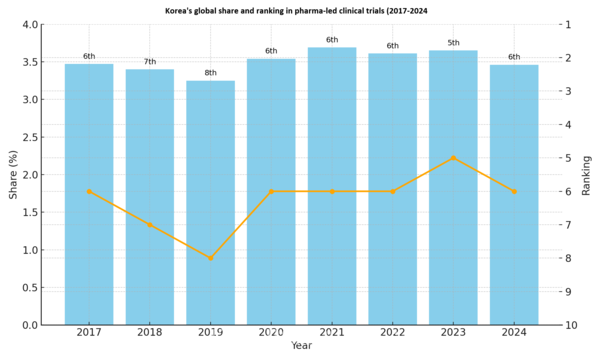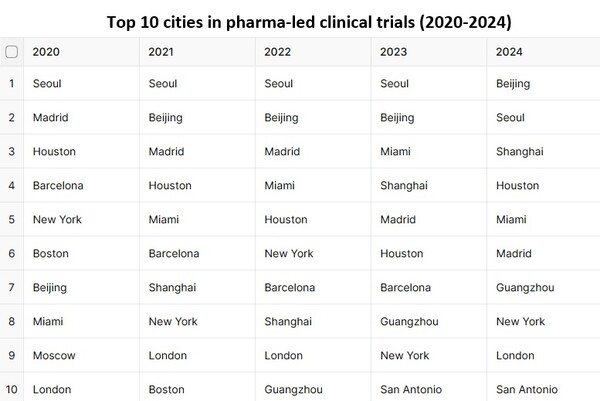Korea has slipped to sixth place globally in the share of pharmaceutical industry-led clinical trials, according to data compiled by the Korea Drug Development Fund.

As of 2024, Korea accounted for 3.46 percent of global clinical trials initiated by multinational pharmaceutical companies, ranking behind the U.S., China, Australia, Spain, and Germany. This marks a decline from previous years, as Korea had risen steadily from sixth in 2020 and 2021 to fifth in 2022 and fourth in 2023.

The capital city, Seoul, also experienced a downturn in its global standing. For the first time since 2017, it lost its top position among cities hosting the largest share of pharma-led clinical trials. In 2024, Seoul recorded a 1.32 percent share, falling to second place behind Beijing.
Beijing has rapidly climbed the ranks in recent years, leaping from seventh in 2020 to second in 2021, and finally overtaking Seoul in 2024. The report also highlights the growing influence of China in clinical research, with three cities—Beijing (1st), Shanghai (3rd), and Guangzhou (7th)—ranking in the global top 10.
The shift underscores intensifying global competition in clinical trial infrastructure and pharmaceutical R&D, as countries race to attract major trials from international drugmakers.
Experts say the recent drop in Korea's global ranking for pharmaceutical-led clinical trials is partly due to the mass departure of medical residents from university hospitals — a key blow to the country's clinical research infrastructure.
Trainee doctors have traditionally played a central role in managing patients participating in new drug trials and collecting clinical data. However, following their departure, remaining professors are now overwhelmed with outpatient duties, overnight ward shifts, and other clinical responsibilities, making it difficult to maintain parallel involvement in research.
“A number of hospitals temporarily halted new patient intake after the walkout of trainee physicians. This led to a pause in clinical trial enrollment for new drugs,” a professor at a major university hospital in Seoul said. “This was one of the key factors behind the country’s drop in rankings.”
There is also growing concern that prolonged conflict between doctors and the government could lead global pharmaceutical firms to categorize Korea as a high-risk country, making it harder to attract follow-up trials in the future.
“Clinical trials require the steady enrollment of new patients, but recent prolonged uncertainties in the medical community have raised doubts if this is possible,” a multinational pharmaceutical company representative said, asking to remain anonymous due to the sensitivity of the issue. “While the Korean offshoots have been trying to explain the situation to their headquarters, many of them are now questioning why the dispute is taking so long.”

